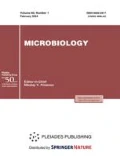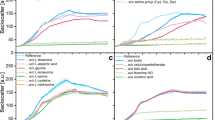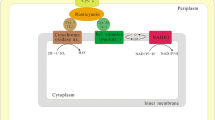Abstract
The moderately thermophilic acidophilic bacteria Sulfobacillus thermosulfidooxidans, strain 1269, S. thermosulfidooxidanssubsp. “asporogenes,” strain 41, and the thermotolerant strain S. thermosulfidooxidanssubsp. “thermotolerans” K1 prefer mixotrophic growth conditions (the concomitant presence of ferrous iron, thiosulfate, and organic compounds in the medium). In heterotrophic and autotrophic growth conditions, these sulfobacilli can grow over only a few culture transfers. In cell-free extracts of these sulfobacilli, key enzymes of the Embden–Meyerhof–Parnas, pentose-phosphate, and Entner–Doudoroff pathways were found. The role of a particular pathway depended on the cultivation conditions. All of the enzymes assayed were most active under mixotrophic conditions in the presence of Fe2+and glucose, suggesting the operation of all of the three major pathways of carbohydrate metabolism under these conditions. However, the operation of the Entner–Doudoroff pathway in strain 41 was restricted under mixotrophic conditions. After the first culture transfer from mixotrophic to heterotrophic conditions, the utilization of glucose occurred only via the Embden–Meyerhof–Parnas and Entner–Doudoroff pathways. After the first culture transfer from mixotrophic to autotrophic conditions, the activity of carbohydrate metabolism enzymes decreased in all of the strains studied; in strain K1, only the glycolytic pathway remained operative. The high activity of fructose-bisphosphate aldolase, remaining in strain 41 cells under these conditions, suggests the involvement of this enzyme in the reactions of the Calvin cycle or of gluconeogenesis.
Similar content being viewed by others
References
Wood, A.P. and Kelly, D.P., Autotrophic and Mixotrophic Growth of Three Thermoacidophilic Iron-Oxidizing Bacteria, FEMS Microbiol. Lett., 1983, vol. 20, pp. 107–112.
Wood, A.P. and Kelly, D.P., Growth and Sugar Metabolism of a Thermoacidophilic Iron-Oxidizing Mixotrophic Bacterium, J. Gen. Microbiol., 1984, vol. 130, pp. 1337–1349.
Karavaiko, G.I., Golovacheva, R.S., Pivovarova, T.A., Tsaplina, I.A., and Vartanyan, N.S., Thermophilic Bacteria of the Genus Sulfobacillus, Biohydrometallurgy, Proceedings of the International Symposium, Norris, P.R. and Kelly, D.P., Eds., Kew: Science and Technology Lett., 1988, pp. 29–41.
Tsaplina, I.A., Bogdanova, T.I., Sayakin, D.D., and Karavaiko, G.I., The Effect of Organic Compounds of the Growth and Pyrite Oxidation by Sulfobacillus thermosulfidooxidans, Mikrobiologiya, 1991, vol. 60, no. 6, pp. 34–40.
Dufresne, S., Bousquet, J., Boissinot, M., and Guay, R., Sulfobacillus disulfidooxidans sp. nov., a New Acidophilic, Disulfide-Oxidizing, Gram-Positive, Spore-Forming Bacterium, Int. J. Syst. Bacteriol., 1996, vol. 46, no. 4, pp. 1056–1064.
Norris, P.R., Clark, D.A., Owen, J.P., and Waterhouse, S., Characteristics of Sulfobacillus acidophilus sp. nov. and Other Moderately Thermophilic Mineral-Sulphide-Oxidizing Bacteria, Microbiology (Reading, UK), 1996, vol. 142, pp. 775–783.
Krasil'nikova, E.N., Bogdanova, T.I., Zakharchuk, L.M., Tsaplina, I.A., and Karavaiko, G.I., Metabolism of Reduced Sulfur Compounds in Sulfobacillus thermosul-fidooxidans, Strain 1269, Mikrobiologiya, 1998, vol. 67, no. 6, pp. 156–164.
Zakharchuk, L.M., Tsaplina, I.A., Krasil'nikova, E.N., Bogdanova, T.I., and Karavaiko, G.I., Carbon Metabolism in Sulfobacillus thermosulfidooxidans, Mikrobiologiya, 1994, vol. 63, no. 4, pp. 573–580.
Tsaplina, I.A., Krasil'nikova, E.N., Zakharchuk, L.M., Bogdanova, T.I., Egorova, M.A., and Karavaiko, G.I., Carbon Metabolism in Sulfobacillus thermosulfidooxidans subsp. asporogenes, Strain 41, Mikrobiologiya, 2000, vol. 69, no. 3, pp. 334–340.
Vartanyan, N.S., Pivovarova, T.A., Tsaplina, I.A., Lysenko, A.M., and Karavaiko, G.I., A New Thermoacidophilic Bacterium of the Genus Sulfobacillus, Mikrobiologiya, 1988, vol. 57, no. 2, pp. 268–274.
Kovalenko, E.V. and Malakhova, P.T., The Spore-Forming Iron-Oxidizing Bacterium Sulfobacillus thermosulfi-dooxidans, Mikrobiologiya, 1983, vol. 52, no. 6, pp. 962–966.
Manning, H.L., New Medium for Isolating Iron-Oxidizing and Heterotrophic Acidophilic Bacteria from Acid Mine Drainage, Appl. Microbiol., 1975, vol. 30, pp. 1010–1015.
Brierley, J.A., Norris, P.R., Kelly, D.P., and LeRoux, N.W., Characteristics of a Moderately Thermophilic and Acidophilic Iron-Oxidizing Thiobacillus, Eur. J. Appl. Microbiol. Biotechnol., 1978, vol. 5, pp. 291–299.
Vartanyan, N.S., Karavaiko, G.I., and Pivovarova, T.A., The Effect of Organic Compounds on the Growth and Oxidation of Inorganic Substrates by Sulfobacillus thermosulfidooxidans subsp. asporogenes, Mikrobiologiya, 1990, vol. 59, no. 3, pp. 411–417.
Karavaiko, G.I., Tourova, T.P., Tsaplina, I.A., and Bogdanova, T.I., Investigation of the Phylogenetic Position of the Aerobic, Moderately Thermophilic Bacteria Oxidizing Fe2+, S0, and Sulfide Minerals and Affiliated to the Genus Sulfobacillus, Mikrobiologiya, 2000, vol. 69, no. 6, pp. 857–860.
Author information
Authors and Affiliations
Rights and permissions
About this article
Cite this article
Karavaiko, G.I., Krasil'nikova, E.N., Tsaplina, I.A. et al. Growth and Carbohydrate Metabolism of Sulfobacilli. Microbiology 70, 245–250 (2001). https://doi.org/10.1023/A:1010463007138
Issue Date:
DOI: https://doi.org/10.1023/A:1010463007138




